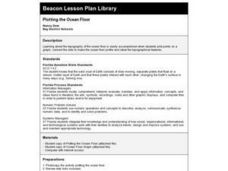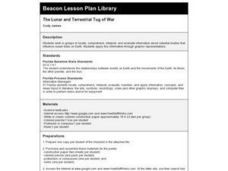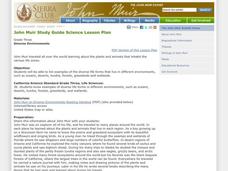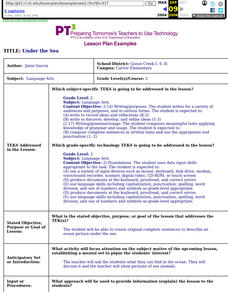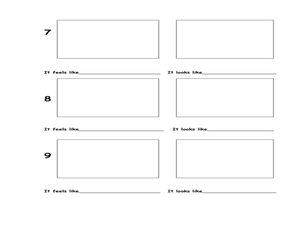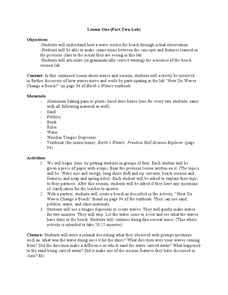Curated OER
A Funny Taste
Learners participate in a demonstration that illustrates the relative amounts of salt in various bodies of water including the Dead Sea, Sallt Lake, Ocean water and distilled water. They taste and compare various mixtures.
Curated OER
High and Low Tides
Students collect real world data from the Web regarding high and low tides at various locations in the United States. They find a function which models this data and make predictions on tide levels based on the information found.
Curated OER
Out of the Deep
Learners observe, describe, and record characteristics of ocean animals (mammals and fish) and sea shells. They conduct an experiment comparing and contrasting sugar water, salt water and fresh water and create a mural of coral reef...
Curated OER
Ocean -- Under The Sea
Young scholars participate in hands-on activities dealing with what lives in the ocean. They also read literature about the oceans.
Curated OER
Ocean Mythology
Pupils examine Greek and Roman mythology concerning the oceans and humankind's relationship with them, and create presentations to share with classmates.
Curated OER
North America, Then and Now
Students identify ocean, lake, gulf, and continent on maps of North America from 1845 and the present, and identify Pacific and Atlantic Oceans, the Great Lakes, and the Gulf of Mexico on maps of North America from 1845 and the present.
Curated OER
SURFACE CURRENTS
Students identify five major ocean currents and identify the correlation between ocean circulation and prevailing winds.
Curated OER
Habitats: Oceans & Deserts
Students perform a variety of lessons to explore deserts and oceans.
Curated OER
Plotting the Ocean Floor
Fourth graders plot points on a graph, connect the dots to make the ocean floor profile and label the topographical features. They utilize a worksheet and a website imbedded in this plan to plot the ocean floor.
Curated OER
The Lunar and Terrestrial Tug of War
Fourth graders, in groups, locate, comprehend, interpret, and evaluate information about celestial bodies that influence ocean tides on Earth. They apply this information through graphic representations.
Curated OER
Geography
First graders recall names and placement of 7 continents. They recall cardinal directions. They identify and locate 3 oceans.
Curated OER
DIVERSE ENVIRONMENTS
Third graders list examples of the diverse life forms that live in different environments, such as oceans, deserts, tundra, forests, grasslands and wetlands.
Curated OER
The Vast Ocean
Students explore oceans, and demonstrate reading comprehension skills, including reading strategies, inference, literal meaning, and critical analysis.
Curated OER
Under The Sea - Describing an Ocean Picture
Second graders create original complete sentences to describe an ocean picture under the sea. After a lecture/demo, 2nd graders use a software program to create their own undersea scene, complete with pictures and writing.
Curated OER
How Harmful Is It?
Students complete a form that requires them to make decisions about how severely different types of marine debris affect people, animals, vessels, communities. Results are totaled and analyzed to determine which types of marine debris...
Curated OER
Fisheries And Songs
Young scholars view examples of songs that have the ocean and its life as their themes. After hearing and reading them, students write their own, having done research on the social and political issues of the ocean's environment.
Curated OER
You Got The Whole World In Your Hands: Geology, Earth's Layers, Science
Pupils make a model of the Earth's crust out of foam in order to better explain the make-up of the Earth's layers. They add continents and oceans.
Curated OER
Oceans of the World
Second graders demonstrate their ability to find the five oceans on a globe and on a world map and relate their knowledge of mountains and other physical characteristics of land masses to the physical characteristics of the ocean floor.
Curated OER
Oceans
In this oceans worksheet, student use clues from a song titled "Oceans," then locate and label the 5 oceans. An answer key is given but page doesn't included a song link.
Curated OER
Obis Oil Spill
Students explore environmental challenges by participating in an oil spill simulation. In this water safety lesson, students discuss why oil spills happen and how their impact affects the entire ecosystem. Students utilize popcorn,...
Curated OER
Exploring Marine Objects
Learners identify the sources of water on Earth. In this life science lesson, students list the different plants and animals that live in the ocean. They explore marine objects in the lab and draw them.
Curated OER
How Do Waves Change a Beach?
Students conduct an experiment on beach erosion. In this earth science lesson, students create a beach model and use tongue depressor to produce waves. They write a journal about their observations.
Curated OER
Modelling Ocean Currents
Learners construct a replica of the Atlantic ocean given certain parameters. In this earth science lesson, students draw their own map of ocean currents. They answer questions related to the activity.
Curated OER
Ocean Floor
Students identify ocean floor features. In this earth science lesson, students predict the object inside a close box to make them realize the difficulties scientists faced then. They label the different zones of the ocean floor after the...










